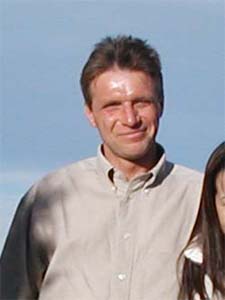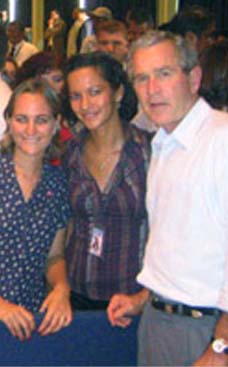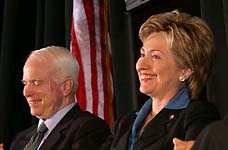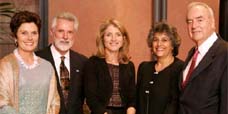
Russell Carollo, a Dayton Daily News reporter, who files as many as one hundred FOIA requests each year. In 2003, Carollo and two fellow reporters used documents obtained through the FOIA to reveal how Peace Corps volunteers, mainly women, have been victims of assault, serious health problems, injury, and even death in foreign lands. “We had a terrible time getting information from the Peace Corps,” he says. “It was difficult to get them to even acknowledge the request.” Until their newspaper sued, that is.
Carollo says most reporters file a FOIA request and then give up if they don’t get the information in a few months. “You need to appeal, you need to negotiate, you need to threaten litigation, and you need to sue,” he says. The problem is the vast majority of reporters don’t have the time, and agencies know this.
Journalists who use the FOIA regularly say it takes patience and determination to make the law work. “The presumption now is that everything is secret,” says Russell Carollo
FOIA Falters
The law still works, but it needs a tune-up
By Martin E. Halstuk
November 7 marks the fiftieth anniversary of the start of congressional hearings on what at the time was a controversial — even radical — federal open-records law. It took a decade of political wrangling, 173 hearings, and all the might of the newspaper industry before the Freedom of Information Act finally became law on July 4, 1966.
Over the decades, the FOIA has helped expose waste and fraud in the federal government, and uncover a wide variety of unsafe consumer products, dangerous drugs, and health hazards. But more recently there has been a steady erosion of the freedoms enshrined in both the letter and the spirit of this law. Increasingly, it requires years of appeals and costly litigation to get an indisputably public record that the government simply does not want to release. The judiciary also has erected hurdles to access by broadly interpreting the FOIA’s exemptions, especially the executive privilege exemption.
Journalists who use the FOIA regularly say it takes patience and determination to make the law work. “The presumption now is that everything is secret,” says Russell Carollo, a Dayton Daily News reporter, who files as many as one hundred FOIA requests each year. In 2003, Carollo and two fellow reporters used documents obtained through the FOIA to reveal how Peace Corps volunteers, mainly women, have been victims of assault, serious health problems, injury, and even death in foreign lands. “We had a terrible time getting information from the Peace Corps,” he says. “It was difficult to get them to even acknowledge the request.” Until their newspaper sued, that is.
San Francisco Chronicle reporter Seth Rosenfeld successfully sued the FBI to obtain records that revealed that in the 1960s, during the tumultuous free speech movement in Berkeley, the bureau had launched a covert — and illegal — campaign to fire then University of California President Clark Kerr and conspired with the CIA to pressure the California Board of Regents to force out liberal professors. Rosenfeld filed his request in 1981, while a journalism student at UC-Berkeley. It took three lawsuits and fifteen years before the FBI began releasing the records, which would form the basis of Rosenfeld’s 2002 series “Reagan, Hoover and the UC Red Scare.” As the court battle played out, the FBI spent $1 million to suppress the documents. To date, Rosenfeld has yet to receive all of the records that the FBI agreed to release, totaling some 17,000 pages. “In my experience, the FBI's reluctance to comply with the FOIA is even greater now, a time when it's collecting more information on citizens that ever before,” he said.
One of the government’s stall tactics is to require that the question of payment be settled — search fees can be costly, though are waived under certain circumstances — before processing a request, says Seth Borenstein, an environmental reporter in Knight Ridder’s Washington bureau. Borenstein ran into this problem after he sought records about governmental censorship of global warming documents, which he wrote about in 2004. The only way Borenstein was able to get officials at the Environmental Protection Agency to start assembling the documents he requested while the search-fee waiver was still unresolved, he says, was to agree in advance to pay whatever the agency charges if his waiver request was ultimately denied.
Carollo says most reporters file a FOIA request and then give up if they don’t get the information in a few months. “You need to appeal, you need to negotiate, you need to threaten litigation, and you need to sue,” he says. The problem is the vast majority of reporters don’t have the time, and agencies know this.
FOIA still works, but it could work much better. Members of Congress on both sides of the aisle seem to recognize this fact and two bills aimed at reforming FOIA have been introduced since February. The OPEN Government Act of 2005, sponsored by Senator John Cornyn, the Texas Republican, seeks to amend the law and close loopholes that agencies routinely exploit. The Faster FOIA Act of 2005, also sponsored by Cornyn, and co-sponsored by Senate Democrats, including Richard Durbin of Illinois and Patrick Leahy of Vermont, would establish a commission charged with identifying methods to cut down on the processing delays that have become all too common. To date, neither bill has come to a vote. The big question is whether lawmakers can muster the political courage needed to pass them. Some attention from the news media might help. It took a decade to pass the FOIA; let’s hope it takes less time than that to fix it.
Martin E. Halstuk teaches communications law at Pennsylvania State University. He is Senior Fellow for the Pennsylvania Center for the First Amendment.














